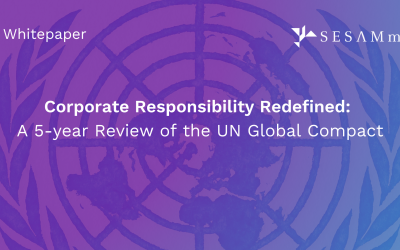Fabrice Rahmouni on what’s required to finance the transition to a sustainable economy
Fabrice Rahmouni, Head of Indices Department at Euronext, talks to Climate Action about how financing the transition to a sustainable economy requires significant investment which cannot be met with public money alone. And how issuers are not only improving transparency and performance in ESG reporting but turning challenges into new opportunities.

Fabrice Rahmouni, Head of Indices Department at Euronext, talks to Climate Action about how financing the transition to a sustainable economy requires significant investment which cannot be met with public money alone. And how issuers are not only improving transparency and performance in ESG reporting but turning challenges into new opportunities.
What is the role of an exchange in the transition towards a sustainable economy?
To understand the role of an exchange in climate transition, it is worth noting that the financing of the transition to a sustainable economy will require massive investment. Public money will represent a big part of this, and that is exactly the ambition of the European Green Deal Plan. But it’s also clear that public money alone will not be enough. That is why, very early on, the EU’s Technical Expert Group (TEG) identified that the financial sector as a whole would need to play a significant role, given its capacity to influence the reallocation of private capital towards more sustainable investments. Exchanges naturally form the core of this financial sector, as they facilitate the relationship between two distinct groups:
- Investors who have capital and are looking for promising investments
- Entrepreneurs and companies looking for money to finance their development and their strategy.
As such, the role of an exchange is to act as a natural and neutral facilitator, and at Euronext it is our goal to engage with the process by providing concrete ESG products and services to our clients. For issuers, for example, our Corporate Services business provides tailor-made ESG Advisory services and offers a set of guidelines on ESG reporting to help listed companies structure their approach to ESG. In terms of products, as the world’s number one bonds listing venue with more than 500 ESG bonds listed from 192 issuers, Euronext has created a dedicated Green Bond segment, an area which is predicted to become an even stronger topic in the coming years. As for indices, I would say that sustainable finance is clearly part of our DNA. Two key points that illustrate this:
- The First Low Carbon Index ever created was launched by Euronext in 2008, a good seven years before the UN Paris Climate Conference (COP21) in 2015 – so we were definitely ahead of the curve.
- In 2019, more than 50% of the ESG structured products sold in Europe were based on Euronext ESG indices. It is evident that the Euronext indices business is recognised as a highly credible ESG index provider.
What type of indices are asset managers requesting?
Our clients have a strong focus on ESG thematic indices, and almost all the Euronext indices developed now are ESG themed. Increasingly, instead of tracking a general ESG theme, we are seeing further specification within ESG topics, ranging from energy transition to climate change to water and more. Euronext also has an open model with regards to ESG data providers, meaning we work with many different providers. This guarantees non-biased data and enables access to a large variety of ESG metrics, which then allows us to offer the best ESG variety and data quality to our clients.
Do you think that by amplifying exposure from historical blue-chip indices ESG will become more mainstream?
That’s indeed a key angle. While blue-chip indices still hold the largest concentration of assets under management (AUM) on ETFs and Structured Products (>80%), we still observe two things. The first is strong interest from product issuers in ESG alternatives to historical blue-chip indices; and the second, growing appetite for derivatives solutions on national blue-chip ESG indices. On top of this, while the pandemic has accelerated global investors’ focus on ESG themes, investors have set ambitious responsible investment commitments for years to come, with concrete divestment targets.
All of this can indicate an evolution of the historical blue-chip indices, and it was in response to this that Euronext launched our new CAC 40 ESG® Index on 22 March this year.
This new index is designed to identify the 40 companies within the CAC® Large 60 index that demonstrate the best Environment, Social, and Governance practices, and responds to the growing demand for a shift towards investment tools with ESG objectives. It applies negative screening and norm-based exclusion filters in accordance with the UN Global Compact Principles, as well as exclusion screening for companies involved in coal, controversial weapons and tobacco activities. The CAC 40 ESG® aims to help investors identify companies that are actively contributing to building a more sustainable future. It is also the first national ESG index derived from the iconic CAC 40® index family.
It’s worth mentioning that in the coming months, Euronext will also launch a CAC 40® Climate index, which will further support investors in taking a balanced and impactful approach in the fight against climate change.
How effective are your ESG advisory services in terms of clarifying ESG strategy for capital markets?
Best-in-class ESG corporate issuers are included in indices and are well identified by asset managers. However, we know that investors are looking for investment opportunities, and want to identify companies that are just starting their ESG transition. The focus of Euronext’s ESG Advisory services is to guide corporate issuers in their ESG transition, helping them meet capital market expectations and find funding from investors. ESG Advisory is a very concrete and applicable support, which is already supporting a range of listed companies in Europe in the alignment of their non-financial reporting with investors’ questions and rating agency guidelines, in their risk and opportunities mapping (shareholding, reputation, governance) and finally in building the ESG pillar of their equity story (messages, KPIs, goals, assessments). The role of Euronext ESG Advisory is to help issuers clarify their ESG strategy with reliable reporting and consistent project prioritisation, as a new opportunity to better engage with investors. All this while helping more sustainable companies become established.
How have the Euronext ESG reporting guidelines assisted companies in their approach to ESG?
Our ESG Reporting Guidelines are a set of principles that support our issuers in a context of increasing expectations from stakeholders in terms of ESG disclosure standards. The guide covers several areas including:
- the growing consideration of ESG criteria by portfolio managers when making investment decisions,
- the benefits of sound ESG practices for corporates,
- tools for issuers to understand the key concept of materiality,
- a comprehensive overview of existing international agreements.
We have conducted several surveys since launching Euronext ESG Reporting Guidelines. It is obvious issuers have various levels of maturity on the topic, but all the same we have observed notable progress on awareness, transparency, and performance. We have also seen how the guide can help issuers focus on how to turn ESG challenges into new opportunities.
Fabrice Rahmouni will be speaking at the Sustainable Investment Forum Europe in April, bringing together asset owners and managers, ratings agencies, banks, UN and Government policymakers, investors, development banks, think tanks, and NGOs committed to driving forward the sustainable finance agenda. Register your place for free here.






